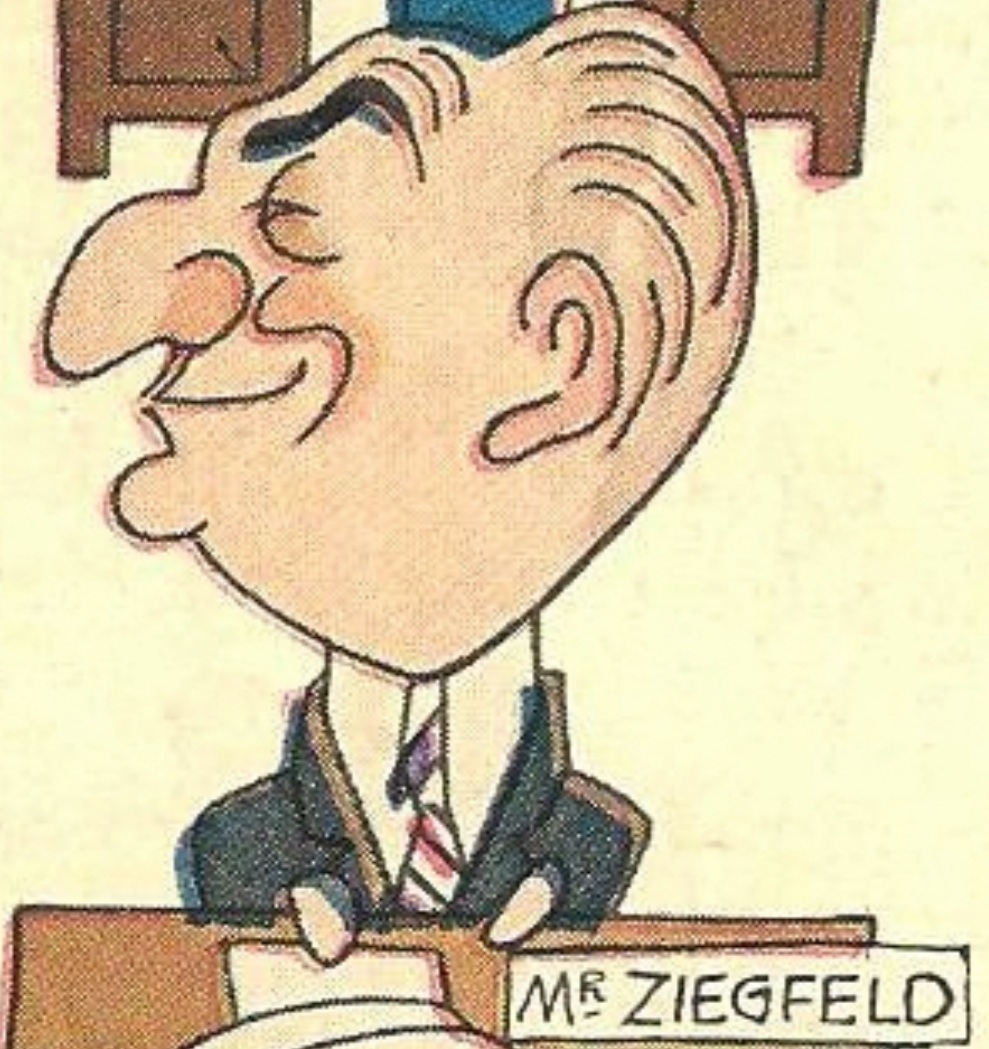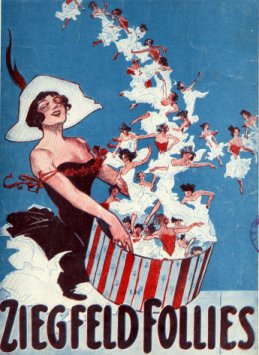|
Chorus Equity Association
The Chorus Equity Association was created on August 12, 1919, in New York City during the strike by the Actors' Equity Association. After Florenz Ziegfeld revealed that he was joining the Producing Managers' Association, the chorus girls in his Ziegfeld Follies created their own union, with the help of a substantial donation from the superstar actress and former chorus girl Lillian Russell. Marie Dressler, another former chorus girl who had gone on to be a major star on the stage, was elected the association's first president. She led them to join the strike, spearheading a march down Broadway in solidarity with Actors' Equity. The Chorus Equity Association merged into the Actors' Equity Association The Actors' Equity Association (AEA), commonly called Actors' Equity or simply Equity, is an American trade union, labor union representing those who work in Theatre, live theatrical performance. Performers appearing in live stage productions w ... in 1955. References En ... [...More Info...] [...Related Items...] OR: [Wikipedia] [Google] [Baidu] |
Chorus Girls' Union, Labor Parade LCCN2014682140
Chorus may refer to: Music * Chorus (song), the part of a song that is repeated several times, usually after each verse * Chorus effect, the perception of similar sounds from multiple sources as a single, richer sound * Chorus form, song in which all verses or stanzas are sung to the same music * Choir, a vocal ensemble * ''Chorus'' (Eberhard Weber album), a 1985 album by jazz composer Eberhard Weber * ''Chorus'' (Erasure album), a 1991 album by English musical duo Erasure ** "Chorus" (Erasure song), a 1991 single from the album * ''Chorus'' (Flying Saucer Attack album), an album by the band Flying Saucer Attack * ''Chorus'' (Mildlife album), 2024 * Chorus UK, a community choir in Sheffield, UK Other entertainment * Greek chorus, a group of performers in the plays of classical Greece who comment on the dramatic action * Chorus, non-principal performers in musical theatre * ''Chorus'' (magazine), a Japanese manga magazine * ''Chorus'' (1974 film), a film directed by Mrinal ... [...More Info...] [...Related Items...] OR: [Wikipedia] [Google] [Baidu] |
New York City
New York, often called New York City (NYC), is the most populous city in the United States, located at the southern tip of New York State on one of the world's largest natural harbors. The city comprises five boroughs, each coextensive with a respective county. The city is the geographical and demographic center of both the Northeast megalopolis and the New York metropolitan area, the largest metropolitan area in the United States by both population and urban area. New York is a global center of finance and commerce, culture, technology, entertainment and media, academics, and scientific output, the arts and fashion, and, as home to the headquarters of the United Nations, international diplomacy. With an estimated population in 2024 of 8,478,072 distributed over , the city is the most densely populated major city in the United States. New York City has more than double the population of Los Angeles, the nation's second-most populous city. [...More Info...] [...Related Items...] OR: [Wikipedia] [Google] [Baidu] |
Actors' Equity Association
The Actors' Equity Association (AEA), commonly called Actors' Equity or simply Equity, is an American trade union, labor union representing those who work in Theatre, live theatrical performance. Performers appearing in live stage productions without a Musical theatre#Definitions, book or through-storyline (vaudeville, cabarets, circuses) may be represented by the American Guild of Variety Artists (AGVA). The AEA works to negotiate quality living conditions, livable wages, and benefits for performers and stage managers. A theater or production that is not produced and performed by AEA members may be called "non-Equity". Background Leading up to the Actors' and Producers' strike of 1929, Cinema of the United States, Hollywood and California in general had a series of workers' equality battles that directly influenced the film industry. The films ''The Passaic Textile Strike'' (1926), ''The Miners' Strike'' (1928) and ''The Gastonia Textile Strike'' (1929) gave audience and produc ... [...More Info...] [...Related Items...] OR: [Wikipedia] [Google] [Baidu] |
Florenz Ziegfeld
Florenz Edward Ziegfeld Jr. (; March 21, 1867 – July 22, 1932) was an American Broadway impresario, notable for his series of theatrical revues, the ''Ziegfeld Follies'' (1907–1931), inspired by the '' Folies Bergère'' of Paris. He also produced the musical ''Show Boat''. He was known as the "glorifier of the American girl". Ziegfeld is a member of the American Theater Hall of Fame. Early life Florenz Edward Ziegfeld Jr. was born on March 21, 1867, in Chicago, Illinois. His mother, Rosalie (''née'' de Hez), who was born in Belgium, was the grandniece of General Count Étienne Maurice Gérard. His father, Florenz Edward Ziegfeld, was a German immigrant whose father was the mayor of Jever in Friesland. Ziegfeld was baptized in his mother's Roman Catholic church. His father was Lutheran. As a child Ziegfeld witnessed the Chicago fire of 1871. Career His father ran the Chicago Musical College and later opened a nightclub, the ''Trocadero'', to profit from the 1893 Wor ... [...More Info...] [...Related Items...] OR: [Wikipedia] [Google] [Baidu] |
Ziegfeld Follies
The ''Ziegfeld Follies'' were a series of elaborate theatrical revue productions on Broadway in New York City from 1907 to 1931, with renewals in 1934, 1936, 1943, and 1957. They became a radio program in 1932 and 1936 as '' The Ziegfeld Follies of the Air''. Founding and history Inspired by the Folies Bergère of Paris, the Ziegfeld Follies were conceived and mounted by Florenz Ziegfeld Jr., reportedly at the suggestion of his then-wife, the actress and singer Anna Held. The shows' producers were turn-of-the-twentieth-century producing titans Klaw and Erlanger. The Follies were a series of lavish revues, something between later Broadway shows and the more elaborate high-class vaudeville and variety show. The first follies, '' The Follies of 1907'', was produced that year at the '' Jardin de Paris'' roof theatre. During the Follies era, many of the top entertainers, including W. C. Fields, Eddie Cantor, Josephine Baker, Fanny Brice, Ann Pennington, Bert Williams, Ev ... [...More Info...] [...Related Items...] OR: [Wikipedia] [Google] [Baidu] |
Lillian Russell
Lillian Russell (born Helen Louise Leonard; December 4, 1860 or 1861 – June 6, 1922) was an American actress and singer. She became one of the most famous actresses and singers of the late 19th and early 20th centuries, praised for her beauty and style, as well as for her voice and stage presence. Russell was born in Clinton, Iowa, but raised in Chicago. Her parents separated when she was 18, and she moved to New York with her mother. She began to perform professionally by 1879, singing for Tony Pastor and playing roles in comic opera, including Gilbert and Sullivan works. Composer Edward Solomon created roles in several of his comic operas for her in London. In 1884, they returned to New York and married in 1885, but in 1886, Solomon was arrested for bigamy. For many years, she was the foremost singer of operettas and musical theatre in the United States, performing continuously through the end of the 19th century. In 1899, she joined the Weber and Fields' Broadway Music ... [...More Info...] [...Related Items...] OR: [Wikipedia] [Google] [Baidu] |
Marie Dressler
Leila Marie Koerber (November 9, 1868 – July 28, 1934), known professionally as Marie Dressler, was a Canadian-born stage- and screen-actress and comedian, popular in Cinema of the United States, Hollywood in early silent film, silent and Great Depression, Depression-era film. After leaving home at the age of 14, Dressler built a career on stage in traveling theatre troupes, and learned to appreciate her talent in making people laugh. In 1892, she started a career on Broadway theatre, Broadway that lasted into the 1920s, performing comedic roles that allowed her to Improvisational theatre , improvise to get laughs. She soon transitioned into screen acting and made several shorts, but mostly worked in New York City on stage. During World War I, along with other celebrities, she helped sell Liberty bonds. In 1914, she played the title role in the first full-length screen comedy, Tillie's Punctured Romance (1914 film), ''Tillie's Punctured Romance'' (1914), opposite Charl ... [...More Info...] [...Related Items...] OR: [Wikipedia] [Google] [Baidu] |
Broadway (Manhattan)
Broadway () is a street and major thoroughfare in the U.S. state of New York (state), New York. The street runs from Battery Place at Bowling Green (New York City), Bowling Green in the south of Manhattan for through the Boroughs of New York City, borough, over the Broadway Bridge (Manhattan), Broadway Bridge, and through the Bronx, exiting north from New York City to run an additional through the Westchester County, New York, Westchester County municipalities of Yonkers, New York, Yonkers, Hastings-on-Hudson, New York, Hastings-on-Hudson, Dobbs Ferry, New York, Dobbs Ferry, Irvington, New York, Irvington, Tarrytown, New York, Tarrytown, and Sleepy Hollow, New York, Sleepy Hollow, after which the road continues, but is no longer called "Broadway".It is variously called the Albany Post Road and Highland Avenue, or both.There are four other streets named "Broadway" in New York City's remaining three boroughs: one each in Brooklyn (Broadway (Brooklyn), see main article) and Stat ... [...More Info...] [...Related Items...] OR: [Wikipedia] [Google] [Baidu] |
Entertainment Industry Unions
Entertainment is a form of activity that holds the attention and interest of an audience or gives pleasure and delight. It can be an idea or a task, but it is more likely to be one of the activities or events that have developed over thousands of years specifically for the purpose of keeping an audience's attention. Although people's attention is held by different things because individuals have different preferences, most forms of entertainment are recognisable and familiar. Storytelling, music, drama, dance, and different kinds of performance exist in all cultures, were supported in royal courts, and developed into sophisticated forms over time, becoming available to all citizens. The process has been accelerated in modern times by an entertainment industry that records and sells entertainment products. Entertainment evolves and can be adapted to suit any scale, ranging from an individual who chooses private entertainment from a now enormous array of pre-recorded products, t ... [...More Info...] [...Related Items...] OR: [Wikipedia] [Google] [Baidu] |
Trade Unions Established In 1919
Trade involves the transfer of goods and services from one person or entity to another, often in exchange for money. Economists refer to a system or network that allows trade as a market. Traders generally negotiate through a medium of credit or exchange, such as money. Though some economists characterize barter (i.e. trading things without the use of money) as an early form of trade, money was invented before written history began. Consequently, any story of how money first developed is mostly based on conjecture and logical inference. Letters of credit, paper money, and non-physical money have greatly simplified and promoted trade as buying can be separated from selling, or earning. Trade between two traders is called bilateral trade, while trade involving more than two traders is called multilateral trade. In one modern view, trade exists due to specialization and the division of labor, a predominant form of economic activity in which individuals and groups concentra ... [...More Info...] [...Related Items...] OR: [Wikipedia] [Google] [Baidu] |








